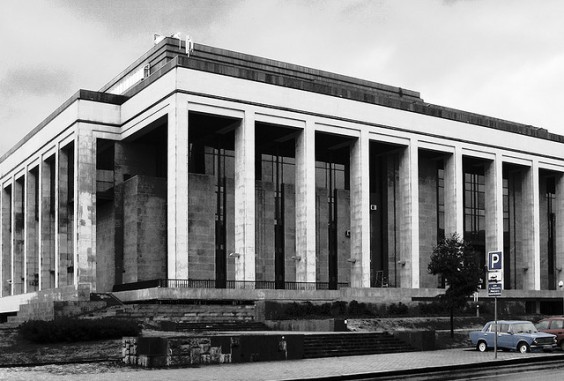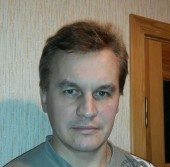The National Science of Secrecy, à la Belarus
by Michał Janczuk / March 10, 2015 / No comments
A confidential document has allegedly placed a ban on photographing administrative buildings in Minsk, the latest example of the Belarusian authorities’ characteristic lack of transparency.

An administrative building in Minsk's town square. Photo via Flickr user: ched cheddles
I live in a country where the most secret institution is the National Academy of Sciences. How lucky for me! Haven’t you heard anything about the recent achievements of Belarusian scientists? No? Well, it’s no wonder. In Belarus, the National Academy of Sciences is a top-secret building.

- Belarus is called the “geographical center of Europe” by its dictator-president. It’s true only if you situate the eastern border of Europe in the Ural Mountains, deep in Russia. I rather doubt we are the center of our continent – but we still could be its good border. Now we just need the simplest thing ever – to build a sustainable, democratic Western-style country after 70 years of Soviet occupation and 20 years under authoritarian regime. Piece of cake. But some of us still believe – it’s always darkest before the dawn.

- Michał Janczuk is a reporter for the independent television station Belsat. In the seven years since Belsat was founded, secret police have raided it four times, destroying their infrastructure inside the country. Janczuk has been denied journalistic accreditation, and is forced to work within Belarus illegally. In 2012, he and a fellow journalist were barred from exiting Belarus. Now able to come and go from his country freely, he still faces the threat of being charged with “unlawful production and dissemination of information.”
A couple of days ago, Dzmitri Lesko, a photojournalist from the Komsomolskaya Pravda newspaper, spent almost four hours in a police station for photographing a newly installed night illumination at the Academy. Building security called the police, and the officers were ready to serve and protect. That is, they were only willing to serve the security guards and protect Dmitry Lesko from his constitutional rights.
Lesko asked why he was detained. Policemen have had an answer for that since February 25th of this year, when they forbade photography of main administrative buildings in Minsk, in accordance with a document signed by the Minister of Interior Affairs. When Lesko asked whether this document was published or not, he received a brilliant answer: no, because it’s a secret document! According to the list, the secret buildings in Minsk are the Central Railway Station, the Government Administration complex, ministerial buildings and so on – although we don’t know what “so on” exactly means, as the list is not published.
National security is an issue of great importance, ranking second place, after human rights, in the hierarchy for me. But for God’s sake, we need published documents if we are to know what is forbidden and what is at least half-allowed. The national tradition of Belarus is for nothing to be completely banned. But if, for example, the Belarusian police tell me tomorrow that I have to register my dreams because of a freshly adopted top-secret document, I have the right not to believe they are telling the truth. At least, to me it seems that I have that right.
Inside, I have many questions to the Minsk police and the Ministry of Interior Affairs, especially to Mr. Ihar Shunievich, who looks like quite a wise guy in his ministerial website photo, where he is decorated in many medals. Even though not all of them are golden, he must know something about Google and it’s street view service. And what about the impact of this “secret document” on the tourism industry, which finances the state budget, and Shunievich’s salary? In a new place, the first thing you do is upload a nice shot of the railway station or airport on Facebook. Unless, as seems to be happening in Minsk, the city has developed a policy of fining tourists when they first step off the plane.
But, unfortunately, I cannot directly ask Mr. Shunievich my questions, because I am an illegal journalist in my country. I work for a foreign media entity, which is not accredited by the Belarusian Foreign Ministry, despite three attempts to receive accreditation in recent years. According to Belarus’s media law, only registered journalists are journalists. Even my happier registered colleagues were unsuccessful in interviewing Mr. Shunievich. The 62 ministries and state entities – which include the Ministry of Culture and the Belarusian State TV and Radio Company – can put a top-secret stamp on any information about their work, just because they want to do so.
Haven’t you heard anything about the recent achievements of Belarusian culture? That’s right! It’s because – SHH! Stamped: CONFIDENTIAL.




